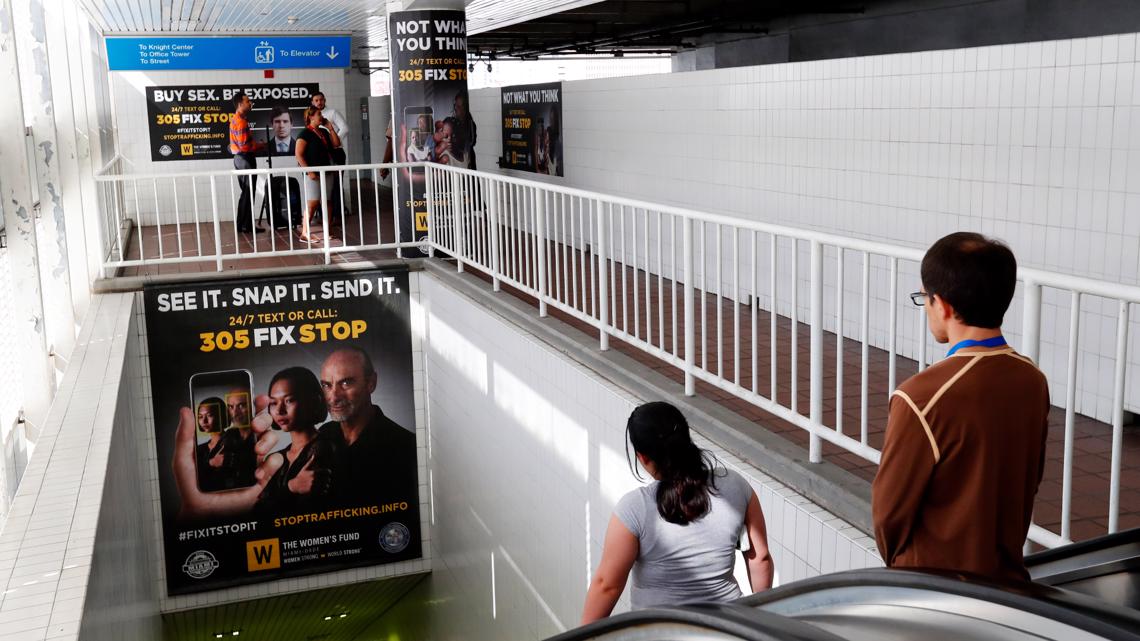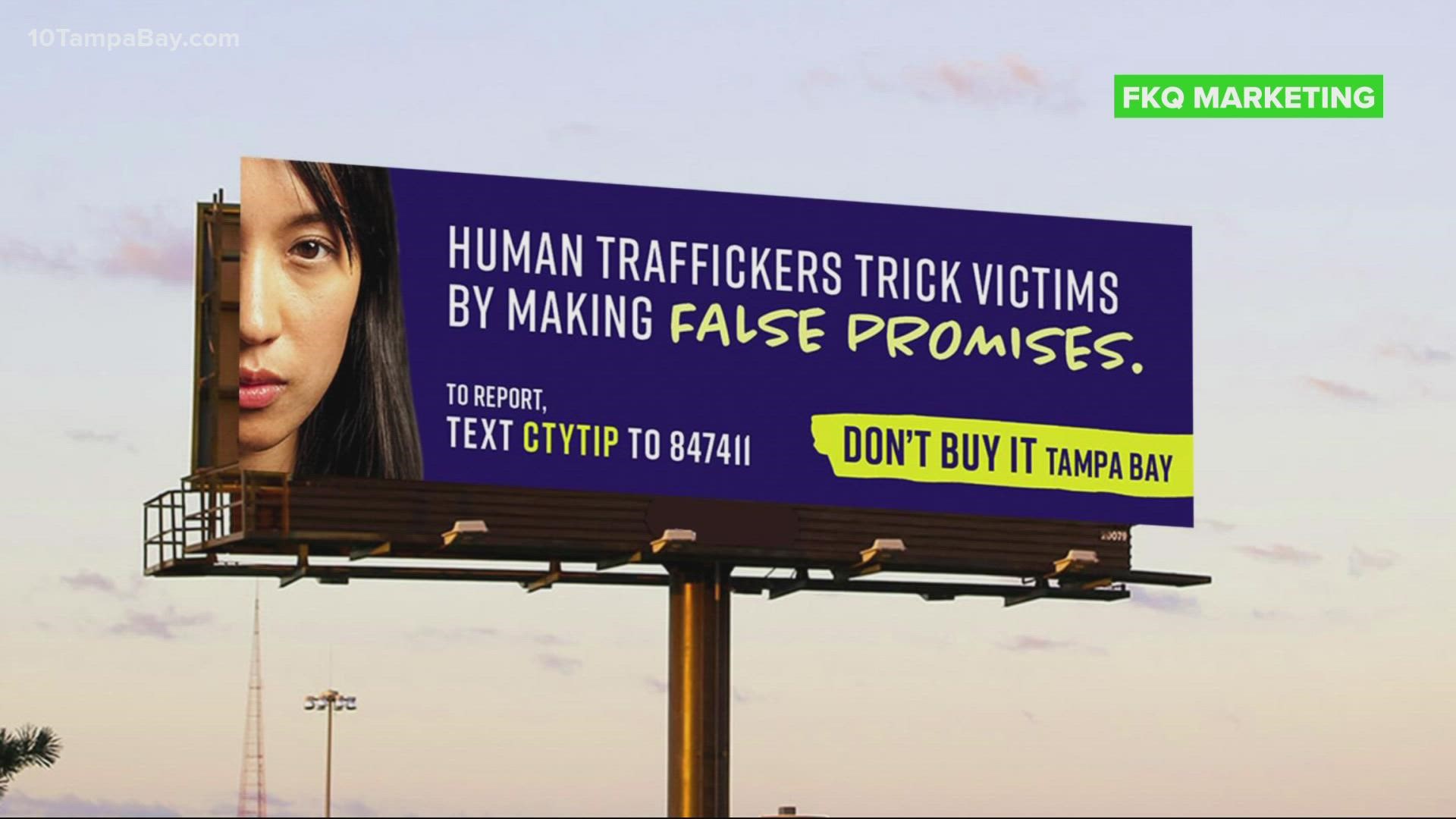TAMPA, Fla. — When the nation’s biggest sporting event returned to Tampa in 2021, law enforcement launched an all-out blitz.
Ahead of Super Bowl LV, authorities cracked down with amped-up ad campaigns and organized stings, warning the annual event was one of the largest magnets for sex trafficking.
This response wasn’t unique to Tampa. Headlines in host cities for years have sounded the alarm about the proliferation of sex trafficking during the Super Bowl.
Prior to the Super Bowl in Miami in 2020, Florida Attorney General Ashley Moody said, "we know the Super Bowl will increase this activity [sex trafficking]."
Others have suggested the big game is the biggest sex trafficking magnet.
THE QUESTION
Is the Super Bowl the largest sex trafficking event?
THE SOURCES
- Joan Reid, professor of criminology at University of South Florida (USF)
- Kim Overman, Hillsborough County Human Trafficking Commission chair
- Global Alliance Against Traffic in Women
- The Anti Trafficking Review
- Sex Workers Outreach Project (SWOP) Tampa Bay
- The Polaris Project
- The International Labor Organization
THE ANSWER
No, despite heightened news coverage and law enforcement response, there is no evidence of a significant spike in sex trafficking driven by the Super Bowl.
WHAT WE FOUND
Human trafficking is estimated to generate $150 billion a year in profits globally, with more than 20 million people being trafficking, according to the International Labor Organization.
Sexual exploitation is a serious and ongoing issue, but the Super Bowl isn't a primary driver, said University of South Florida (USF) criminologist Joan Reid.
"The research just doesn't really support the idea that sex trafficking has a huge spike during the Super Bowl," said Reid, who leads a research lab on USF's St. Petersburg campus devoted to studying human trafficking.
Reid said she has reviewed hundreds of case files in the 15 years she has studied trafficking. None, she said, have ever referenced or mentioned the Super Bowl or any other large event.
There is “no empirical evidence that trafficking for prostitution increases around large sporting events,” concluded a report published in 2011 by Global Alliance Against Traffic in Women, a network of non-governmental organizations. The organization studied crime records surrounding the Super Bowl, World Cup and Olympics. The report noted its findings, “despite massive media attention, law enforcement measures and efforts by prostitution abolitionist groups.”
More recently, a study in 2019 examining 55 scholarly articles on big sporting events like the Super Bowl and sex trafficking rates also found little evidence of a direct link.
Online ads for sex work tend to increase around large events, the report noted, but it doesn't correlate with an increase in trafficking. "Online ads are a substitute measure for trafficking and should not be understood as the same thing," the report states.


The idea the Super Bowl—or any other large sporting event—drives a surge in demand for sex because men flush with cash and testosterone flood into a city, doesn't jibe with what researchers know about sex buyers, according to Reid.
An estimated two to five percent of the male population will ever buy sex, Reid said, and a majority are prolific buyers.
“So if you know that’s true—that they’re buying sex throughout the year—then the focus on the Super Bowl isn’t really going to have the impact that you want," she said.
After Super Bowl LV in Tampa, the Hillsborough County Sheriff’s Office announced the arrest of 75 people accused of either trying to buy or sell sex.
Three were charged with trafficking.
But even Hillsborough County Sheriff Chad Chronister said, "One thing we’ve learned is it’s not just special events that create that human trafficking."
Hundreds of people nationwide have been rounded up on accusations of trying to pay for or sell sex surrounding previous Super Bowls. Reid says it’s due to heightened scrutiny and attention—and often it can wind up targeting sex workers, not necessarily trafficking.
“Unfortunately there were a lot of arrests for prostitution, which is not the focus we really want in this situation," Reid said. "We want the focus to be on the traffickers and the buyers."
Comparisons to the rest of the year are rare, which also makes it difficult to pinpoint a Super Bowl spike.
“You’re focusing that moment on that problem and so you’re going to see it more," Reid said.
Kim Overman, who chairs Hillsborough County's Human Trafficking Commission, agrees it’s not an issue unique to any one big mass gathering.
"No, no not at all," Overman said. "Human trafficking is a problem 24/7, unfortunately, especially, in the state of Florida."
And it's both sex trafficking and labor trafficking, Overman points out, the latter of which often doesn't receive the same attention. The International Labor Organization estimates 68 percent of people trafficked worldwide are victims of labor trafficking in industries including agriculture, manufacturing, and domestic work.
What's true is Florida ranks third in the nation for hotline calls to report suspected sex trafficking. Overman suspects it's partly because of awareness campaigns in the state.
The Super Bowl, Overman said, offers an undeniably large platform for advocacy surrounding the topic that she hopes will last throughout the year.
The Sex Workers Outreach Project (SWOP) Tampa Bay, a group "dedicated to the fundamental human rights of sex workers...focusing on ending violence and stigma through education and advocacy," argues it's prostitution stings that increase around the Super Bowl, not sex trafficking.
"Human trafficking is when a person is forced or coerced into doing nonconsensual sexual labor, where sex work is a job choice," reads a statement SWOP provided to 10 Tampa Bay. "In local stings supposedly aimed at trafficking, up to 100 sex workers are arrested at a time. The arrested workers are burdened with a criminal record, hefty fees, and court appearances."
The group argues sex workers are the "most well positioned" to help law enforcement and social services locate and help victims.
The Polaris Project, an anti-trafficking group that operates the National Human Trafficking Hotline, has echoed the assessment that more prostitution arrests occur during Super Bowl weekend.
“What Trafficking Hotline data does show, however, is that sex and labor trafficking are a problem in every state, every day of the year and towns and cities across the country require long-term solutions to respond to this crime every day of the year, not just around the Super Bowl,” a Polaris spokesperson wrote in a prior statement.
Reid hopes the increased awareness around the Super Bowl will help educate people about the year-round response needed to combat trafficking.
"This can happen any given Sunday – it’s not just the Super Bowl Sunday," Reid said.
If you or someone you know is a victim of human trafficking there is help. The National Human Trafficking Hotline operates a 24-hour hotline and can be reached by phone at 1-888-373-7888, by texting HELP to BeFree (233733), or by chat to talk about your needs, your options, and the resources they have available to help you.

